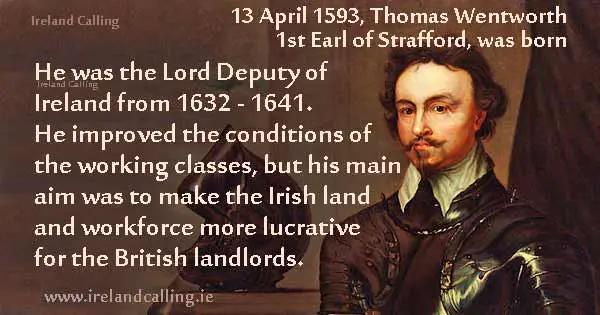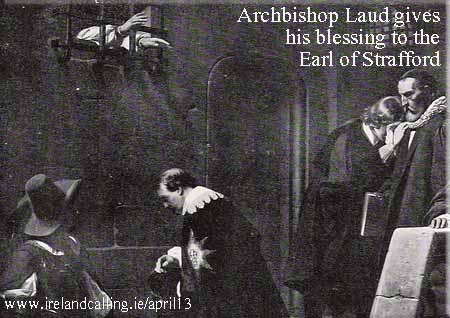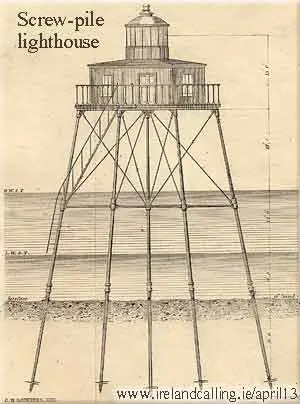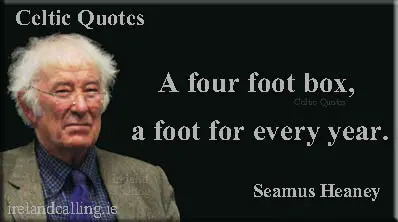april-top.html
1593 Thomas Wentworth, 1st Earl of Strafford, was born on this day in 1593. He was the Lord Deputy of Ireland from 1632 up until his death by execution in 1641. King Charles gave Strafford the title and responsibility of Ireland and initially he seemed to do good work.
 He improved the conditions for the working classes, and built strong trade links with Spain. He was also tolerant of the Catholic Church despite being a Protestant and removed several inept British officials from their posts.
He improved the conditions for the working classes, and built strong trade links with Spain. He was also tolerant of the Catholic Church despite being a Protestant and removed several inept British officials from their posts.
However, the Irish people didn’t thank him for his good work. Although their lives had improved in some aspects, Strafford was making the changes in order to make the Irish land and workforce more lucrative for the British landlords.
Strafford’s demise began when he started making enemies of powerful figures in Ireland. He clashed with Richard Burke, 4th Earl of Clanricarde over his attempt to take the County of Galway. Burke died as a result of the disagreement, and his son, Ulick Burke, 5th Earl of Clanricarde, blamed Strafford for the death of his father.
Strafford also foolishly made an enemy of Richard Boyle, 1st Earl of Cork. He felt threatened by Cork’s influence in British parliament and attempted to remove him from power with a series of petty charges.
These were unsuccessful and Cork, used his influence to patiently cast a doubt over Strafford in Britain. Strafford was recalled to Britain as personal advisor to Charles regarding the potential war with Scotland. He advised a heavy military attack, which was opposed by parliament.
Following further disagreements in policy, Strafford was seen as an obstacle and the British parliament charged him with treason and sentenced him to death. King Charles, who had been Strafford’s most powerful ally, signed the death warrant and Strafford was executed in London in front a crowd of thousands.
Click here to read more about Irish history

* * *
 1780 Alexander Mitchell was born in Dublin on this day in 1780. He was a mathematician and engineer, and he is most remembered for being the inventor of the screw-pile lighthouse.
1780 Alexander Mitchell was born in Dublin on this day in 1780. He was a mathematician and engineer, and he is most remembered for being the inventor of the screw-pile lighthouse.
Mitchell was blind, and worked on the design with his son. It was a method of significantly improving the stability of lighthouses built on soft ground.
The screw that secured the structure into the seabed had previously been straight and smooth, leaving it vulnerable to becoming dislodged.
Mitchell’s design was a twisted sharp screw that would hold its position more robustly in soft, wet ground. The design was patented by Mitchell and his son and soon used all around the world.
Click here to read about more great Irish scientists
* * *
1906 Samuel Beckett was born in Dublin on this day in 1906. He was a successful playwright and regarded by his peers as one of the most influential writers of his time. His most famous work is the play, Waiting for Godot. Beckett was awarded the Nobel Prize for Literature in 1969.
Click here to read about more great Irish writers

1939 On this day in Belfast in 1939, Nobel Prize winner Seamus Heaney was born. Heaney was a successful writer and poet, and won the Nobel Prize for Literature in 1995. He remains one of Ireland most popular poets, and after his death in 2013, numerous tributes came from distinguished figures such as Andrew Motion and former president Bill Clinton.
The day after Heaney died, he was honoured by a crowd of more than 80,000 people, who stood and applauded for three minutes at an All-Ireland Gaelic football match.
Heaney’s emotional poem, Mid-term Break, about the death of his younger brother when they were both children, was voted Ireland’s third favourite poem in a 1999 poll.
Click here to read more about Seamus Heaney
Click here to read about more great Irish writers
Click here to read the poem, Mid-term Break
Click here to read Ireland’s 100 favourite poems

* * *
1980 Happy birthday to Jason Maguire, born in Co Meath on this day in 1980. He is a professional jockey, and in 2011 he won the Grand National on board 14/1 shot, Ballabriggs.
* * *
2008 On this day in 2008, Robert Greacen died in Dublin. Greacen was born in Derry and was one of Ireland’s most admired poets. In 1995, he won the Irish Times Literature Prize for Poetry for his Collected Poems.
He had several works published, including The Bird, A Garland for Captain Fox, Young Mr Gibbon and Protestant Without a Horse.
Click here to read Ireland’s 100 favourite poems
april-bottom.html